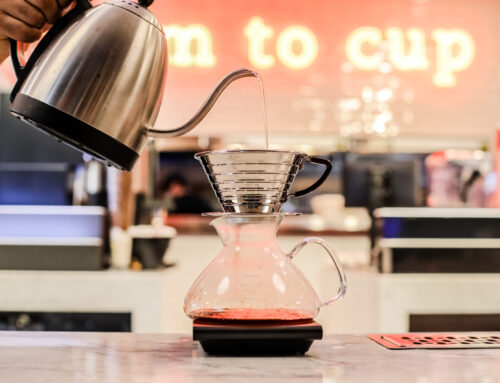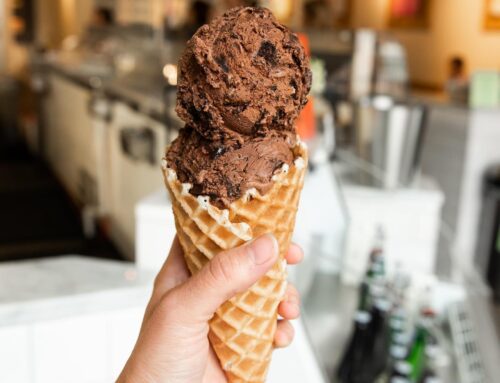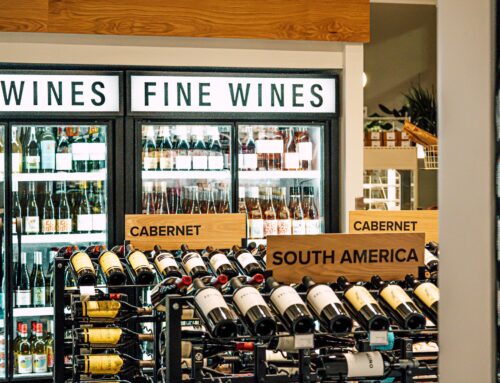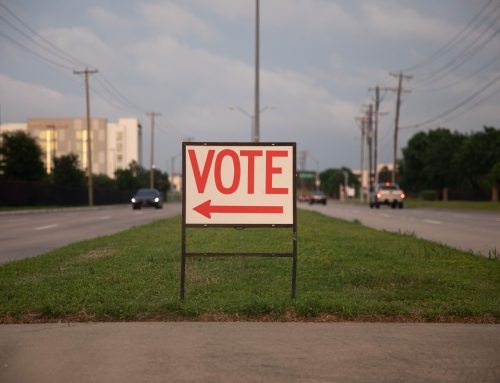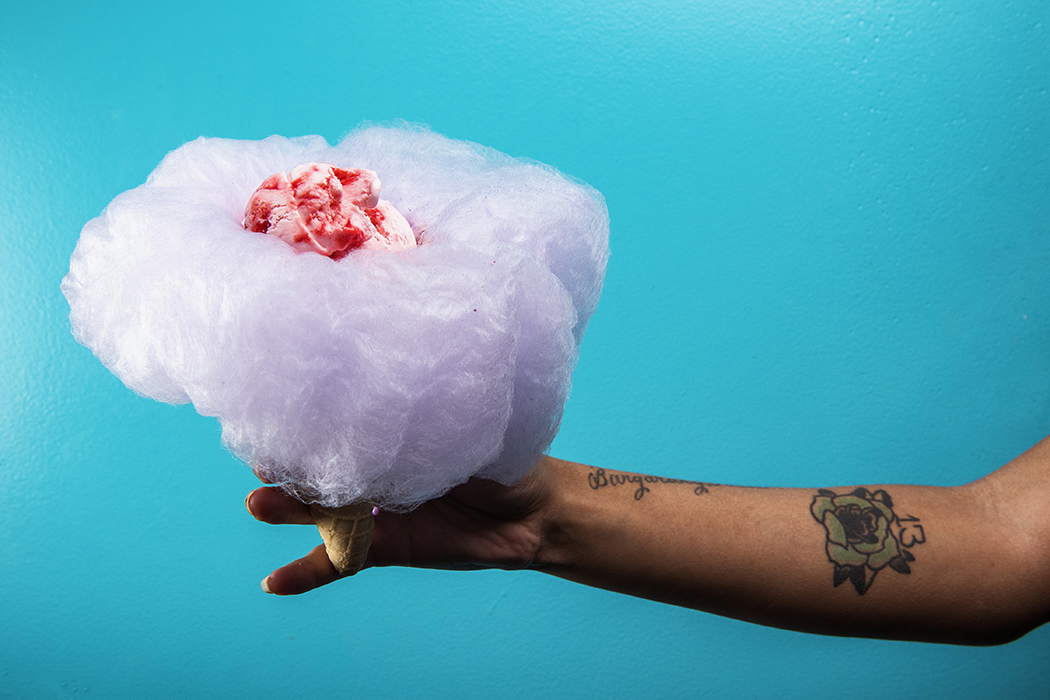
Hypnotic Emporium is the cold, creamy sister to Hypnotic Donuts; both businesses known for their unusual and eye-catching sweet treats on Garland Road. (Photo by: Danny Fulgencio)
Hipster paradise
You can find an ice cream cone (locally sourced, of course) encased in billowy cotton candy. You can buy pricey cactus string art. Two places sell vinyl — and one is mostly by appointment only. You can find dozens of craft beers and a slew of cocktails garnished with fresh berries and herbs, usually served in a petit glass that’s easily sloshed.
Unconventional boutiques and trendy foods — all independently owned — make cities such as Brooklyn and Portland a magnet for the cool. In recent years, those amenities have come home to roost on Garland Road, giving it the potential to become one of Dallas’ destination spots, like Deep Ellum or Bishop Arts in Oak Cliff.
That wasn’t always the case.
Just 10 years ago, the strip of state highway from Garland-Gaston-Grand to Peavy Road was dotted mostly with nail salons, service shops and eateries that were more homespun than hipster.
So what was the catalyst for this tsunami of chic? Is it sustainable? And is “chic” really what neighbors want next door?
“It’s an interesting canary in the coal mine,” says Dallas City Council member Mark Clayton. “I don’t think anyone saw Garland Road developing this fast.”
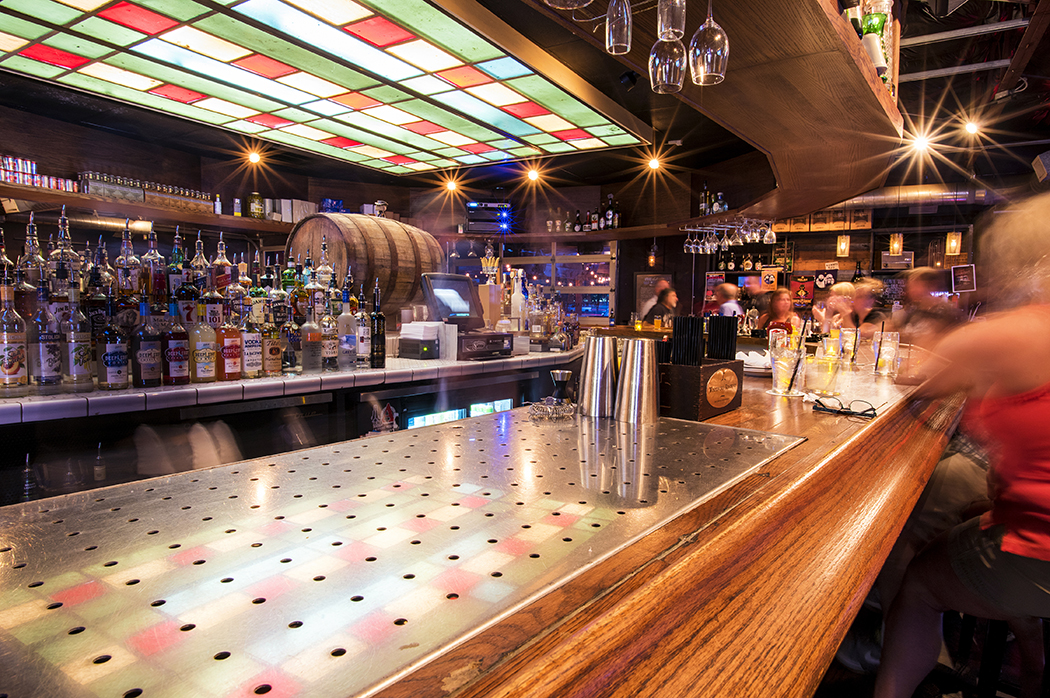
With its unique design and hearty fare, Goodfriend Beer Garden and Burger House quickly became a neighborhood staple. (Photo by: Danny Fulgencio)
In the beginning, there were tacos
Many credit restaurateur Jeanna Johnson with opening the flood gates of possibility with the launch of Good 2 Go Taco in 2009. She says it was just an affordable spot for a new business with limited funds, admitting she has a soft spot for her own neighborhood.
“We knew we wanted to stay in 75218,” Johnson says.
She leased a small corner of Green Spot gas station at 702 Buckner, near the Garland Road corridor. For many in the neighborhood, it was like opening an oasis in the desert. It offered a fresh option to the land of diners and drive-thrus.
“[Johnson] is the reason we’re all here,” says Matt Tobin, co-owner of Goodfriend Beer Garden & Burger House and Goodfriend Package on either sides of Peavy at Garland. “She proved it was possible to have a really successful restaurant in this neighborhood.”
Good 2 Go quickly outgrew the gas station. In need of a full-sized shop, Johnson signed a lease at 1146 Peavy Road, a stone’s throw from Garland Road.
“We opened with ice on the ground thinking it would be slow,” she says. “It was just gangbusters.”
A new era arrived, and even the Dallas Observer took note, writing in 2011: “…[Good 2 Go sells] upscale tacos for yuppies and hipsters — the sort of crowd that, on a hot day this summer, attracted a mobile clothes designer in a tricked-out short bus.”
Johnson shut down the shop last year because she wanted to pursue something different, not for lack of business. While she was there, though, she contacted a lot of friends, encouraging them to consider Garland Road. That included Tobin; Amy and James St. Peter, the couple behind funky Hypnotic Donuts; and Jonathan Meadows with his “micro-roasting” Cultivar Coffee, solidifying a cornerstone of any hipster neighborhood — a costly, and laboriously produced, cup of joe.
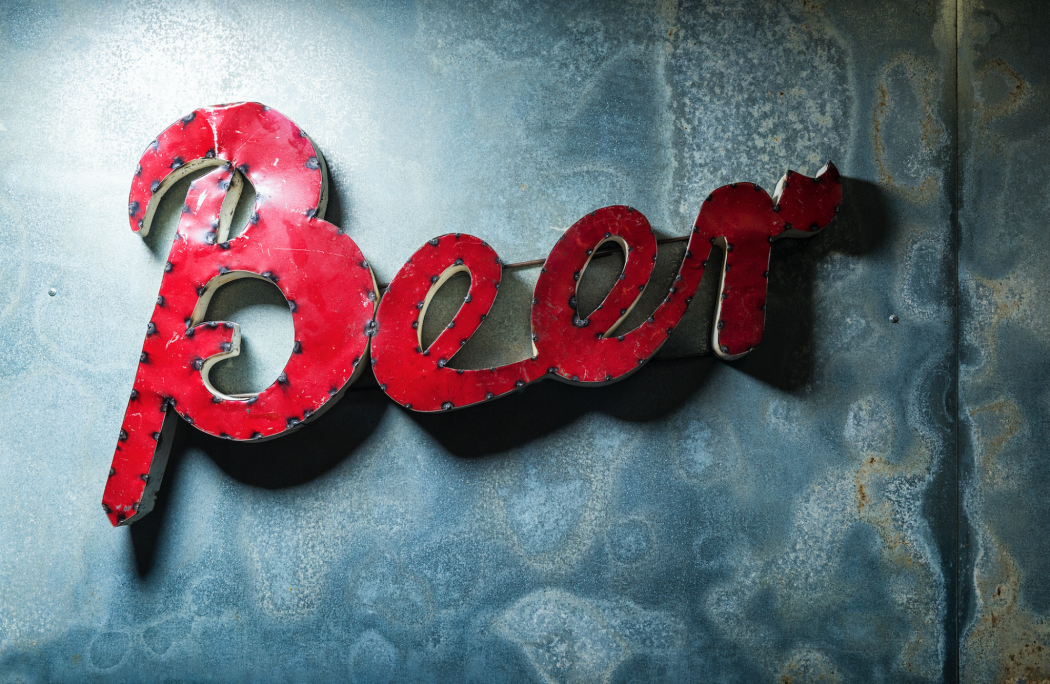
Goodfriend Beer Garden and Burger House. (Photo by Danny Fulgencio)
Liquor is quicker
In November 2010, Tobin and partner Josh Yingling sat, lease in hand, watching election results pour in. It was the year Dallas residents voted to change the liquor laws, allowing restaurants in previously “dry” areas to drop the restrictive “private club” policy that required adults to hand over their driver’s license and get a Unicard, thus becoming a member, to order a beer or cocktail.
What’s more, the election also changed a deterring restriction that limited where and how restaurants purchased the beer, wine and liquor they sell, providing big savings for small establishments.
Tobin and Yingling had a vision for a beer garden and burger joint that would offer the neighborhood something different. East Dallas neighbors themselves, they admit their motivation was at least a little selfish.
“We wanted to open somewhere we’d want to hang out,” Tobin says.
They eyed the former Texas Trap site, a longtime dive bar known for its boarded-up windows, uneven floors and biker crowd. It was a classic leftover from the days when Garland Road was little more than a state highway dotted with “roadhouse-style” establishments. The building sat vacant for eight years until Tobin and Yingling came calling.
“It was trashed,” Yingling says.
But they weren’t signing a lease until they saw the final results of the wet/dry vote, a necessity for their beer-dependent business model. They hoped the area would go fully wet, the most permissive designation. Instead, Garland Road voted to become “partially wet,” meaning any business that sells alcohol for consumption on site (i.e. not a liquor store) is required to make 51 percent of sales from food, and must restrict liquor sales to 49 percent. Plus, it must keep two totally different sets of books to prove the balance, an added inconvenience for a small business.
“It’s really hard to keep that ratio,” Tobin says. “Those laws were written when beers were $1 and made up maybe one-quarter of your check. Today, you get two drinks with dinner and alcohol covers half your check.”
They moved forward with their plans to open Goodfriend Beer Garden and Burger House anyway, spending months rehabbing the dilapidated building into a trendy industrial space studded with reclaimed wood, concrete floors and garage-door openings.
“[Goodfriend] completely changed the neighborhood when they came in,” says Jeff Snoyer, who has owned Highland Park Cafeteria at Casa Linda Plaza since 2007 and keeps a close eye on the neighborhood. “People started to pay attention to this area in a big way.”
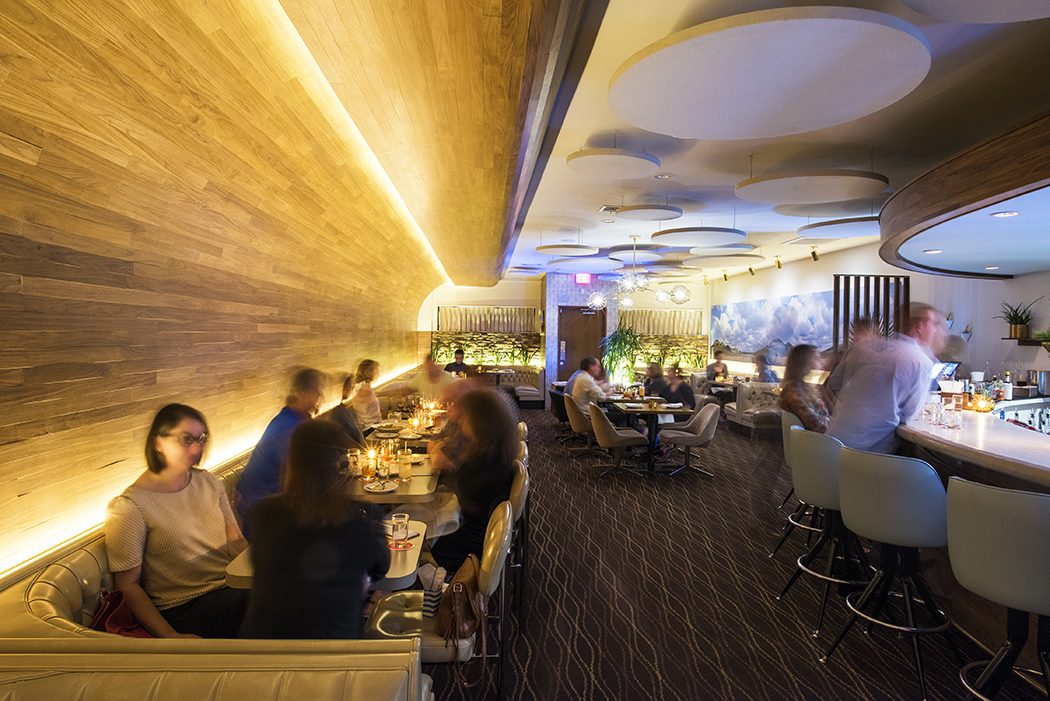
Lounger Here is inspired by vintage airplane bars, and its rounded wood roof was hand-built by co-owner Tony Barsotti. (Photo by: Danny Fulgencio)
Rockstars invade
You know you’ve arrived when two of the city’s biggest rock stars set their sights on Garland Road.
Julie Doyle, longtime member and manager of multi-voiced The Polyphonic Spree, and Tony Barsotti, drummer of 1990s punk rock icon Hagfish, wanted to open a lounge, something chic and comfortable that harkened back to the days of high-flying airplane bars when stewardesses wore short dresses and mixed strong martinis at 30,000 feet.
“We knew we weren’t going to open too far past Peavy Road because that neighborhood isn’t there yet,” Barsotti says.
Lounge Here at 9028 Garland was welcomed with great fanfare last year. Open till 2 a.m. with a full menu, it was seen by some as a gamble on the sleepy highway, but one that paid off. Its popularity proves Garland Road can support a stylish place to hang out after-hours.
“It has its own draw,” Barsotti says, adding that people from Addison, Highland Park and beyond often make the trek. “We get commuters, but we’re also a destination spot.”
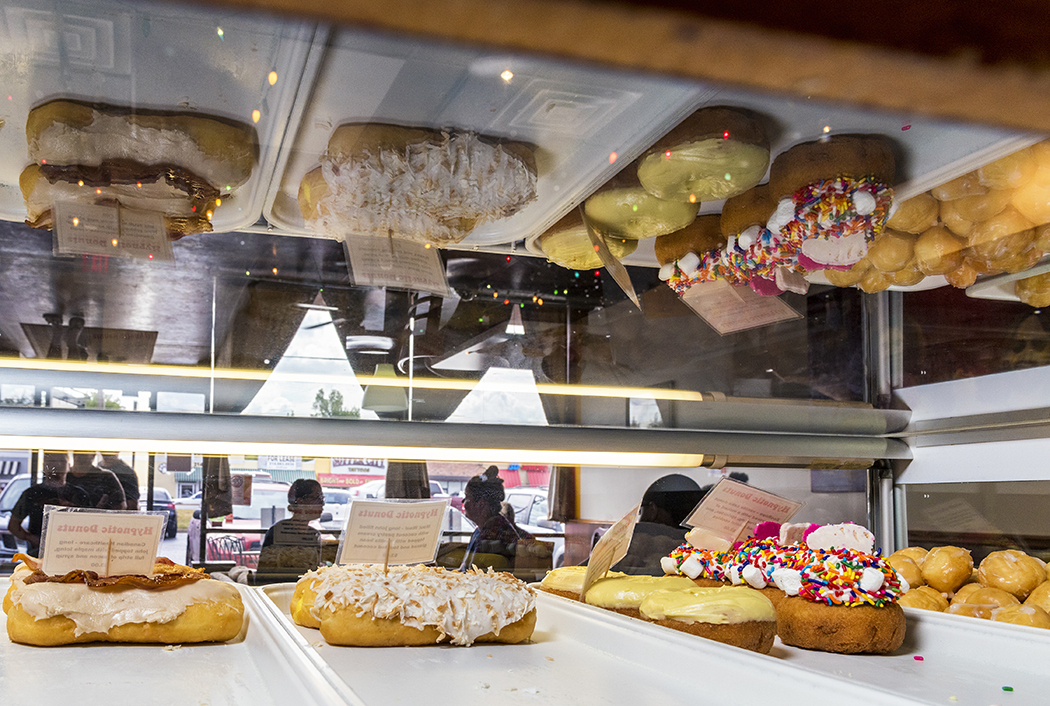
Hypnotic Donuts’ elaborate toppings add to Garland Road’s unique flavors. (Photo by: Danny Fulgencio)
Doubling down
Since 2010, small businesses have flourished on Garland Road.
Hypnotic Donuts was welcomed with lines around the door as sweet seekers flocked to the fantastical flavors when it opened in 2012. The popularity continued to grow after the shop was named on Buzzfeed’s “33 Donuts You Have to Try Before You Die” list, along with more than a dozen “best breakfast” nods in regional and national publications, and a few Food Network spots.
“We draw people from all over the Metroplex,” says owner James St. Peter.
Hypnotic has been so successful, he and his wife
decided to establish a second shop on Garland Road, opening an old-timey ice cream parlor called Hypnotic Emporium in 2016 right next door to their donut joint.
They weren’t the only business owners who decided to double down on Garland Road.
After four successful years with their beer garden, Tobin and Yingling went into retail in 2015. They opened Goodfriend Package store across the street, selling unusual beers and prepared foods. Cultivar Coffee joined them with a corner coffee counter.
“This area has been good to us,” Yingling says. “It made sense to stay here where we have customers.”
The same was true for Lounge Here’s Doyle. Just a month after launching the bar, she and Good Records proprietor Chris Penn opened Good Pagoda next door, arguably the most hipster boutique in all of Dallas. Themed after indie-filmmaking darling Wes Anderson, the business has a myriad of “The Royal Tenenbaums” inspired oddities, such as Gwyneth Paltrow’s face on stud earrings, or fine art paintings of the movie’s characters.
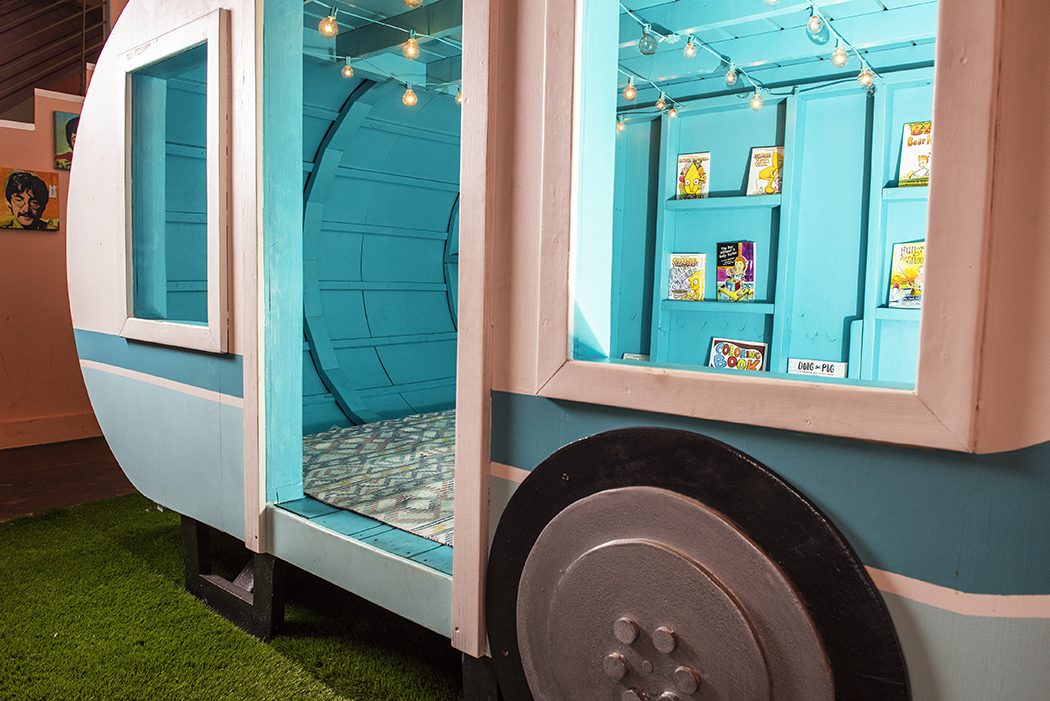
Good Pagoda’s Wes Anderson-inspired aesthetic makes it as visually pleasing as it is quirky. (Photo by: Danny Fulgencio)
Big-name chains take notice
Once independent businesses changed the face of Garland Road, national chains began looking for their piece of the pie.
Chick-fil-A opened in June at 9111 Garland Road, while Raising Cane’s is under construction near the Gaston-Garland-Grand intersection.
Earlier this year, Panera split the neighborhood between those who wanted the healthy fast-casual chain and those who wanted the space to be filled by something more unique. Panera eyed an old medical office off Beachview just south of Casa Linda Plaza, but its request was contingent on a drive-thru. Dallas City Council member Mark Clayton says he has no problem with Panera, but doesn’t think drive-thrus are appropriate on Garland Road.
“I make a lot of my decisions based on the Garland Road Vision Plan,” he says, referencing a 2010 city-approved document that neighbors produced to help guide development decisions. “It says that drive-thrus are not the best way to go.”
Clayton has been a champion of small businesses, many agree, bringing more attention to Garland Road than other councilmembers who served District 9. But he’s pragmatic: He knows a mom-and-pop shop doesn’t have the resources to take on the massive, asbestos-filled former medical building that Panera considered.
“As a council person, I am not a market maker,” he says. But he adds: “Whether it’s Lakewood or Lochwood, I am always looking to protect the character.”
Chipotle is now eyeing the parking lot across from the medical building. Clayton doesn’t have a problem with that chain because there’s no drive-thru. He does favor independent development that adds charm to the area, but says “it’s about balance.”
Small business owners are nervous about the big-money interest on Garland Road. Hypnotic Donuts is known for its chicken biscuit, but now faces lower-priced competition from Chick-fil-A on that dish.
“To me, that’s the downside of becoming a destination, and nothing against those businesses, it’s just harder for small producers,” says James St. Peter.
He has already seen rents spike and worries the character-building businesses won’t be able to make their finances work in a “destination market,” much like what happened in Deep Ellum.
“If I was new coming in, I wouldn’t come here,” he says.
Clayton is sensitive to those concerns, but also knows “you can’t masterplan your way to utopia.”
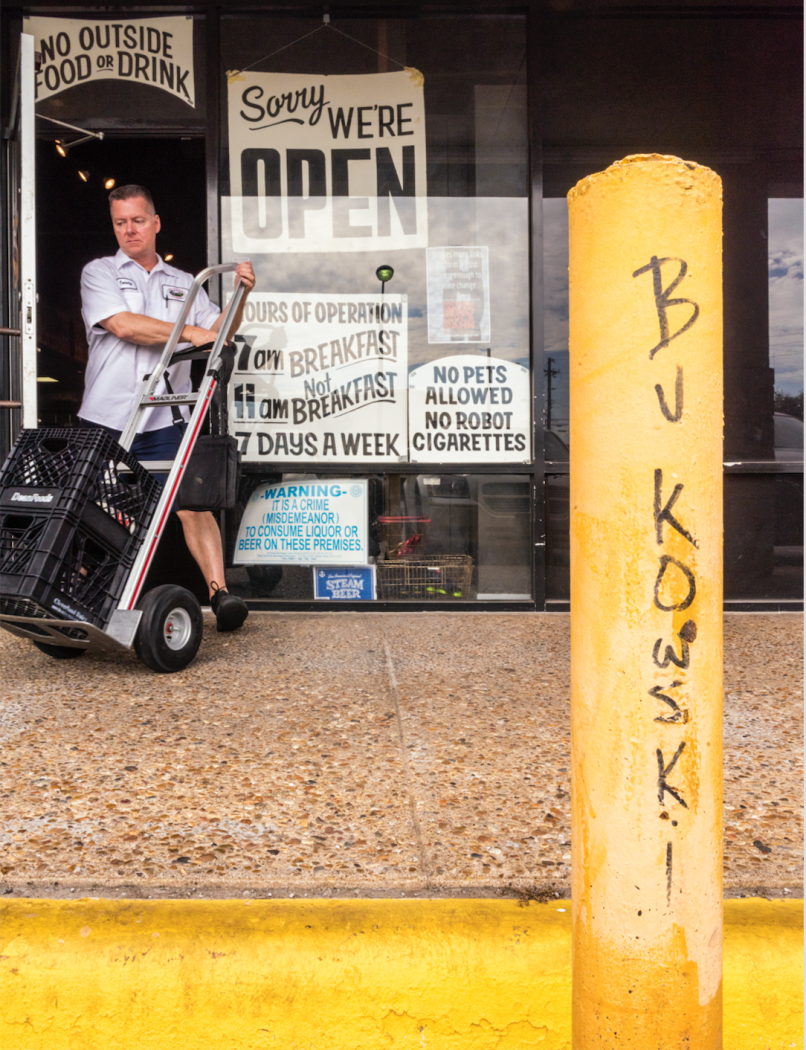
Even the graffiti is hip on Garland Road. (Photo by Danny Fulgencio)
What is ‘smart development’?
Of the neighborhoods that line Garland Road’s most heavily developed stretch, Forest Hills, Little Forest Hills and Lake Park Estates are the most vocal. They helped to shut down a 294-unit apartment complex proposal perceived as too dense for the neighborhood this summer. The involved neighbors have a fairly united vision for growth in their neighborhood, something that maintains the small-town feel. Many support the idea of an overlay district that would limit the size and scope of new projects, especially when it comes to setbacks from the road. No one wants the neighborhood to look or feel like Uptown.
“I think the conversation should be development for people, not people in cars,” says Patrick Blaydes, a Little Forest Hills neighbor who works in urban planning. “There is the potential to create a really unique neighborhood.”
Unlike some corners of Dallas, these neighborhoods say they aren’t anti-development — in fact, they are desperate for some “smart builds.” They know it will take deep pockets to redevelop the strip-mall lined street, but they are hoping for a creative developer such as Monte Anderson, who breathed life back into part of Oak Cliff without ripping down structures or building big-box stores.
“It’s hard sometimes to accept good development over great development,” Blaydes says, knowing there must be give and take. “You need people who are respectful and knowledgeable, not just yelling with pitchforks.”
But “smart development” lies in the eye of the beholder. And perspectives don’t always align on what the neighborhood needs.
“There is this extreme perception that we want nothing more than cute mom-and-pop shops,” says John Olson, a Little Forest Hills resident and member of the Greater East Dallas Chamber of Commerce’s Garland Road Vision Committee. “There has to be a balance.”
He supported Panera’s drive-thru proposal, saying young families east of the lake are eager for a healthy, affordable place to grab a quick meal for the kids. He was happy to see Chick-fil-A open this year, but also helped chic new Smokey Rose establish its place in the neighborhood across from the arboretum.
“There has to be a happy medium,” he says, between the national chains and the unique independent businesses.
Olson also questions pedestrian-friendly ideals expressed in the Garland Road Vision, saying that despite multiple efforts, sidewalks have not succeeded on this state-owned highway. Sidewalks outside the arboretum were recently approved, only because it’s city-owned property.
Blaydes says sidewalks would be nice, but it’s more important to attract the right mix of business.
“It’s about creating multipliers that keep people in place,” he says, such as opening an ice cream shop next to a restaurant, something that keeps retail patrons in an area, moving from business to business, as in Bishop Arts.
“We have to think of what this neighborhood will be in 20 years, 30 years or 50 years,” Blaydes says.
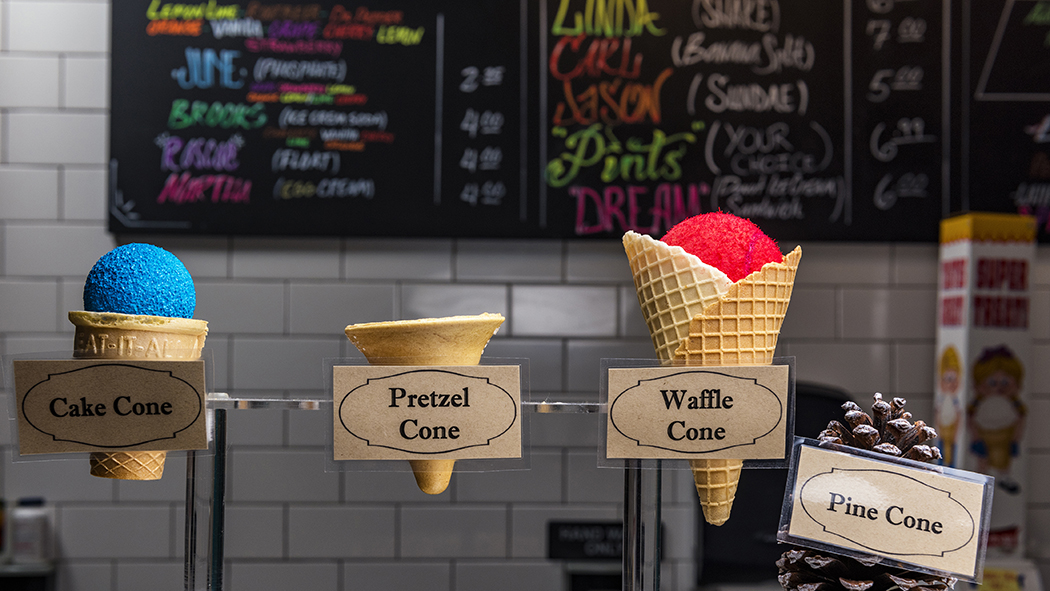
Hypnotic Emporium (Photo by: Danny Fulgencio)
What’s next?
Many on Garland Road have their eyes on Jeff Brand of Brand Partners. He has been building and rehabilitating projects throughout East Dallas for more than a decade with the conservation sensibility of a neighbor and the mind of a businessman.
“He gets it, especially Garland Road,” Clayton says.
Brand punctuates that point: “I wish we could have all local restaurants, that’s what I personally prefer. I think the challenge is that investors have to make their investments back.”
Most recently, Brand snatched up the former Lucky Dog Books site at 10801 Garland Road, north of Peavy and just beyond that well-gentrified corner. It’s a wide lot, where he envisions a restaurant with an outdoor patio. He doesn’t have a tenant yet, but he hopes to piggyback on Goodfriend’s hip vibe at Peavy and Garland.
“We are trying to create a reason for people to go farther down the road,” he says.
His strategy involves hiring Instagram-famous artists to paint murals on the building’s side, while a bright blue front door adds to the artistic vibe. He hopes the stylish touches will help potential tenants see the possibility in the building, but he remains pragmatic.
“We have the option to demolish the building. If someone like a chain wants the space but needs a new building, we’d consider that,” he says. “There’s a balance between what we desire and what is best for our investors.”
It’s an allegory for much of the street, where the desire for charm and the need to make a profit teeter in a delicate balance heavily influenced by zoning laws.
Restaurants coming to Garland Road face a tougher challenge than they might on fully wet Lower Greenville, where alcohol sales can buffer the bottom line. Limiting restaurants’ liquor sales can mean limiting hours and price points, owners say.
Tobin and Yingling know there would be a late-night crowd for Goodfriend, but they also know very few customers order burgers after 10 p.m. So they close at midnight “because staying open later would screw up our liquor ratio,” Tobin says.
Lounge Here went another direction, staying open until 2 a.m. with a full menu, including desserts and small-bites that appeal to the after-hours crowd. But there’s a trade-off to keep liquor and food sales in harmony with state laws.
“It’s a bittersweet deal. If you want to go somewhere to drink, you’re stuck paying higher food prices,” says Here co-owner Barsotti. “That’s how we balance it.”
Before a business even gets to food costs, it must comply with city code on parking, which usually requires one space for each 100 square feet. Lounge Here contracted with a neighboring church to meet the city’s demand, but options for additional parking on the heavily developed strip are limited. While many neighbors favor trendy restaurants, they have zero tolerance for overflow parking crowding residential streets.
“There’s a couple things you don’t do, and one is, ‘Thou shalt not screw with Little Forest Hills’ parking,’ ” jokes Clayton.
These hurdles won’t keep businesses out, but rising rents might. There’s a lot of paranoia about selling out the charm of the area, making it unaffordable for these unique businesses to stay in place. It’s happened in other parts of the city and remains fresh on a lot of minds.
“I call this the Brooklyn of Dallas,” Brand says. “It could become a victim of its own success. Is Deep Ellum cool anymore? Is Bishop Arts?”
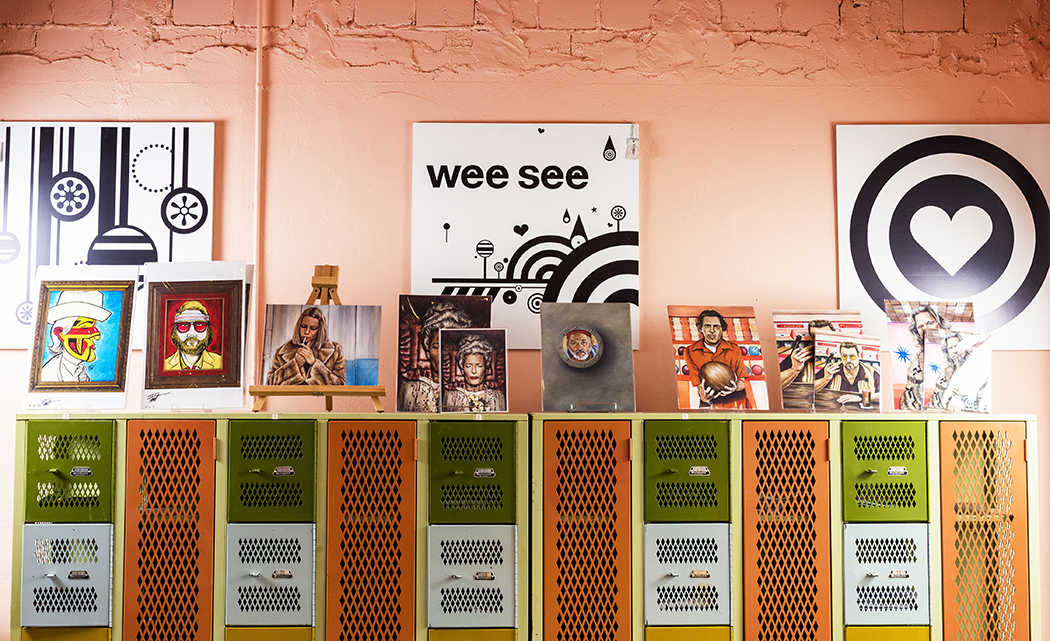
Good Pagoda is a pop culture paradise. (Photo by: Danny Fulgencio)

